Ask a question from expert
constitutional Law Assignment PDF
46 Pages19123 Words228 Views
Added on 2022-01-21
constitutional Law Assignment PDF
Added on 2022-01-21
BookmarkShareRelated Documents
+CONSTITUTIONAL LAW-2 (QUESTION BANK ANSWERS) (UNIT1-4)
UNIT-1:
LONG ANSWERS:
1. The office of the Comptroller and Auditor General of India is the pivotal office in the
Government of India which controls the entire financial system of the country at the
Union as well as State levels. What is the official mandate of CAG’s office?
[Short notes 1+2]
SHORT NOTES:
1. What is the official mandate of CAG’s office?
OFFICIAL MANDATE OF CAG’s OFFICE:
The comptroller and Auditor-General shall be such as may be determined by
Parliament by law and, until they are so determined, shall be as specified in the
Second Schedule:
Provided that neither the salary of a Comptroller and Auditor-General nor his
rights in respect of leave of absence, pension or age of retirement shall be The
Comptroller and Auditor General of India (CAG) is a Constitutional Authority.
The CAG is the sole authority prescribed in the Constitution entrusted with the
responsibility of audit of accounts of the Union and the States. The duties of the
CAG also extend to the audit of Government companies and corporations and
bodies and authorities in accordance with the laws made by the legislature and
rules made thereunder. Parliament has enacted the Comptroller and Auditor
General’s (Duties, Powers and Conditions of Service) Act, 1971 which
determines the condition of the service of the CAG and prescribes his duties and
powers and other matters connected with or incidental to the Act.
ART 148 – Comptroller and auditor general of India
1. There shall be a Comptroller and Auditor-General of India who shall be appointed by
the President by warrant under his hand and seal and shall only be removed from office
in like manner and on the like grounds as a Judge of the Supreme Court.
UNIT-1:
LONG ANSWERS:
1. The office of the Comptroller and Auditor General of India is the pivotal office in the
Government of India which controls the entire financial system of the country at the
Union as well as State levels. What is the official mandate of CAG’s office?
[Short notes 1+2]
SHORT NOTES:
1. What is the official mandate of CAG’s office?
OFFICIAL MANDATE OF CAG’s OFFICE:
The comptroller and Auditor-General shall be such as may be determined by
Parliament by law and, until they are so determined, shall be as specified in the
Second Schedule:
Provided that neither the salary of a Comptroller and Auditor-General nor his
rights in respect of leave of absence, pension or age of retirement shall be The
Comptroller and Auditor General of India (CAG) is a Constitutional Authority.
The CAG is the sole authority prescribed in the Constitution entrusted with the
responsibility of audit of accounts of the Union and the States. The duties of the
CAG also extend to the audit of Government companies and corporations and
bodies and authorities in accordance with the laws made by the legislature and
rules made thereunder. Parliament has enacted the Comptroller and Auditor
General’s (Duties, Powers and Conditions of Service) Act, 1971 which
determines the condition of the service of the CAG and prescribes his duties and
powers and other matters connected with or incidental to the Act.
ART 148 – Comptroller and auditor general of India
1. There shall be a Comptroller and Auditor-General of India who shall be appointed by
the President by warrant under his hand and seal and shall only be removed from office
in like manner and on the like grounds as a Judge of the Supreme Court.
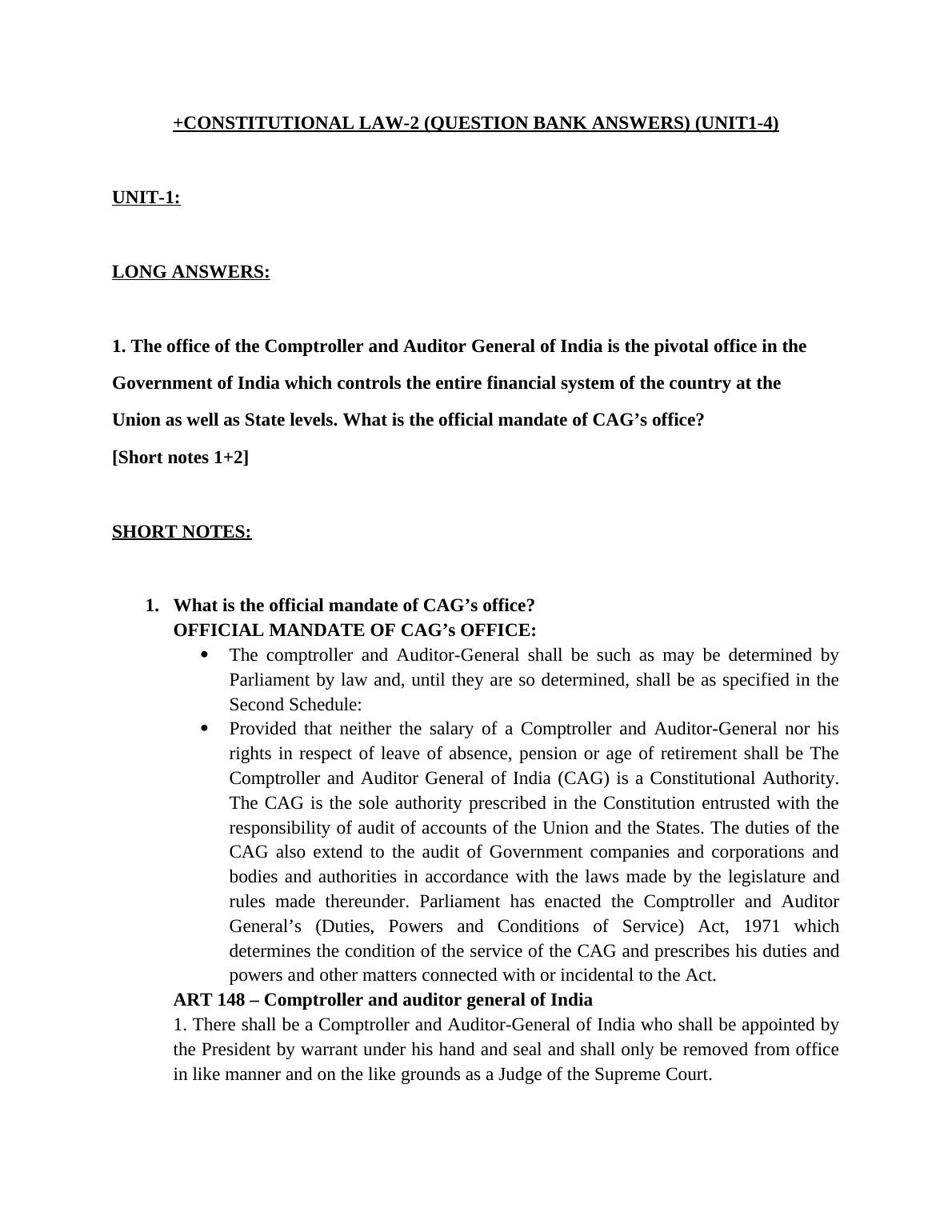
2. Every person appointed to be the Comptroller and Auditor-General of India shall,
before he enters upon his office, make and subscribe before the President, or some
person appointed in that behalf by him, an oath or affirmation according to the form set
out for the purpose in the Third Schedule.
3. The salary and other conditions of service of the Comptroller varied to his
disadvantage after his appointment.
4. The Comptroller and Auditor-General shall not be eligible for further office either
under the Government of India or under the Government of any State after he has
ceased to hold his office.
5. Subject to the provisions of this Constitution and of any law made by Parliament, the
conditions of service of persons serving in the Indian Audit and Accounts Department
and the administrative powers of the Comptroller and Auditor-General shall be such as
may be prescribed by rules made by the President after consultation with the
Comptroller and Auditor-General.
6. The administrative expenses of the office of the Comptroller and Auditor-General,
including all salaries, allowances and pensions payable to or in respect of persons
serving in that office, shall be charged upon the Consolidated Fund of India.
2. What are the duties and powers of Comptroller and Auditor General of India?
[Pg 551 full side]
UNIT-2
LONG ANSWERS:
1. Independence of Judiciary is an essential attribute of rule of law. Judicial Review is
oneof the most potent weapon in the armory of law. Explain with the help of decided case
laws how the independence of judiciary has been ensured and secured through
theelaborate provisions in the Constitution. (Article 124(4) and (5); Article 217 and
Article222)
INDEPENDENCE OF JUDICIARY:
Independence of Judiciary is indispensable in democratic system of governance.
The constitutional makers were keen to ensure that the judiciary was independent
before he enters upon his office, make and subscribe before the President, or some
person appointed in that behalf by him, an oath or affirmation according to the form set
out for the purpose in the Third Schedule.
3. The salary and other conditions of service of the Comptroller varied to his
disadvantage after his appointment.
4. The Comptroller and Auditor-General shall not be eligible for further office either
under the Government of India or under the Government of any State after he has
ceased to hold his office.
5. Subject to the provisions of this Constitution and of any law made by Parliament, the
conditions of service of persons serving in the Indian Audit and Accounts Department
and the administrative powers of the Comptroller and Auditor-General shall be such as
may be prescribed by rules made by the President after consultation with the
Comptroller and Auditor-General.
6. The administrative expenses of the office of the Comptroller and Auditor-General,
including all salaries, allowances and pensions payable to or in respect of persons
serving in that office, shall be charged upon the Consolidated Fund of India.
2. What are the duties and powers of Comptroller and Auditor General of India?
[Pg 551 full side]
UNIT-2
LONG ANSWERS:
1. Independence of Judiciary is an essential attribute of rule of law. Judicial Review is
oneof the most potent weapon in the armory of law. Explain with the help of decided case
laws how the independence of judiciary has been ensured and secured through
theelaborate provisions in the Constitution. (Article 124(4) and (5); Article 217 and
Article222)
INDEPENDENCE OF JUDICIARY:
Independence of Judiciary is indispensable in democratic system of governance.
The constitutional makers were keen to ensure that the judiciary was independent
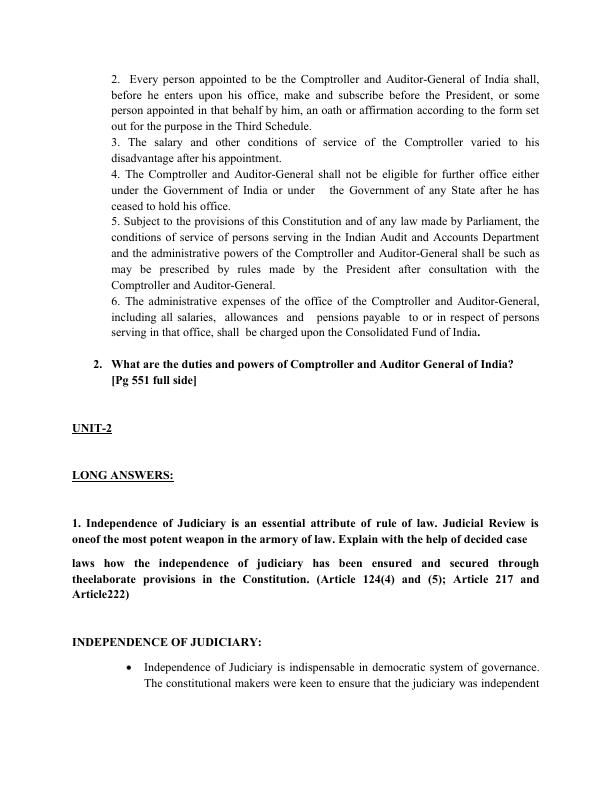
from the executive. An independent, impartial and fearless judiciary was our
constitutional creed.
In C. Ravi ChandranIyer v justice A.M Bhattacharjee, the SC held that only the
CJI is considered to be the first among Judges and can take action against an
erring HC judge or CJ whose bad conduct falls short of impeachment.
The constitution has already put nail squarely on the projections, prosecution or
attempt by any forum or association or otherwise, to instigate or inquire the
conduct of judges or the performance of his duties and on-off court behavior.
Thereby no other authority can inquire or instigate into the conduct or acts of the
judge.
Appointment of judges:
Independence of judiciary starts from appointment of judges.Article 217, clause
(1) vests the powers of appointment of Judges of High Courts in the Central
Government, but such power is exercisable only after consultation with the Chief
Justice of India, the Governor of the State and the Chief Justice of the High Court.
i. S.P Gupta & others v UOI – judge’s transfer case: The Supreme Court
held that consultation is a mere suggestion not concurrence and is not
binding on the President. It held that the constitutional functionaries had
merely a consultative role and that the power to appoint the judges is
solely vested in the central gov.
ii. SC Advocates-on-record v Union of India - The judgment in S.P. Gupta's
Case is now reversed that the court has held that the opinion of the Chief
Justice shall be binding on the President as he is more competent than
other constitutional machineries to accrue the merit of a candidate.
Removal of judges: Article 124 (4)(5)
A judge may be removed from his office by the order of the president only on the
grounds of proven misbehavior or incapacity after an impeachment motion passed
by each house supported by a stipulated majority. Their tenureand different
process of removal is also in tune with their independent function.
The order of the president can bepassed only when it has been addressed to both
Houses of Parliament in the same session. The address must be supported by a
majority of the total membership of that House and also by a majority of not less
than two third of the members of that house present and voting.
In the case K. Veeraswami v UOI, the SC held that a judge of the SC and HC can be
prosecuted and convicted for criminal proceedings. They can be removed in the grounds
of proven misbehaviour or incapacity.
constitutional creed.
In C. Ravi ChandranIyer v justice A.M Bhattacharjee, the SC held that only the
CJI is considered to be the first among Judges and can take action against an
erring HC judge or CJ whose bad conduct falls short of impeachment.
The constitution has already put nail squarely on the projections, prosecution or
attempt by any forum or association or otherwise, to instigate or inquire the
conduct of judges or the performance of his duties and on-off court behavior.
Thereby no other authority can inquire or instigate into the conduct or acts of the
judge.
Appointment of judges:
Independence of judiciary starts from appointment of judges.Article 217, clause
(1) vests the powers of appointment of Judges of High Courts in the Central
Government, but such power is exercisable only after consultation with the Chief
Justice of India, the Governor of the State and the Chief Justice of the High Court.
i. S.P Gupta & others v UOI – judge’s transfer case: The Supreme Court
held that consultation is a mere suggestion not concurrence and is not
binding on the President. It held that the constitutional functionaries had
merely a consultative role and that the power to appoint the judges is
solely vested in the central gov.
ii. SC Advocates-on-record v Union of India - The judgment in S.P. Gupta's
Case is now reversed that the court has held that the opinion of the Chief
Justice shall be binding on the President as he is more competent than
other constitutional machineries to accrue the merit of a candidate.
Removal of judges: Article 124 (4)(5)
A judge may be removed from his office by the order of the president only on the
grounds of proven misbehavior or incapacity after an impeachment motion passed
by each house supported by a stipulated majority. Their tenureand different
process of removal is also in tune with their independent function.
The order of the president can bepassed only when it has been addressed to both
Houses of Parliament in the same session. The address must be supported by a
majority of the total membership of that House and also by a majority of not less
than two third of the members of that house present and voting.
In the case K. Veeraswami v UOI, the SC held that a judge of the SC and HC can be
prosecuted and convicted for criminal proceedings. They can be removed in the grounds
of proven misbehaviour or incapacity.
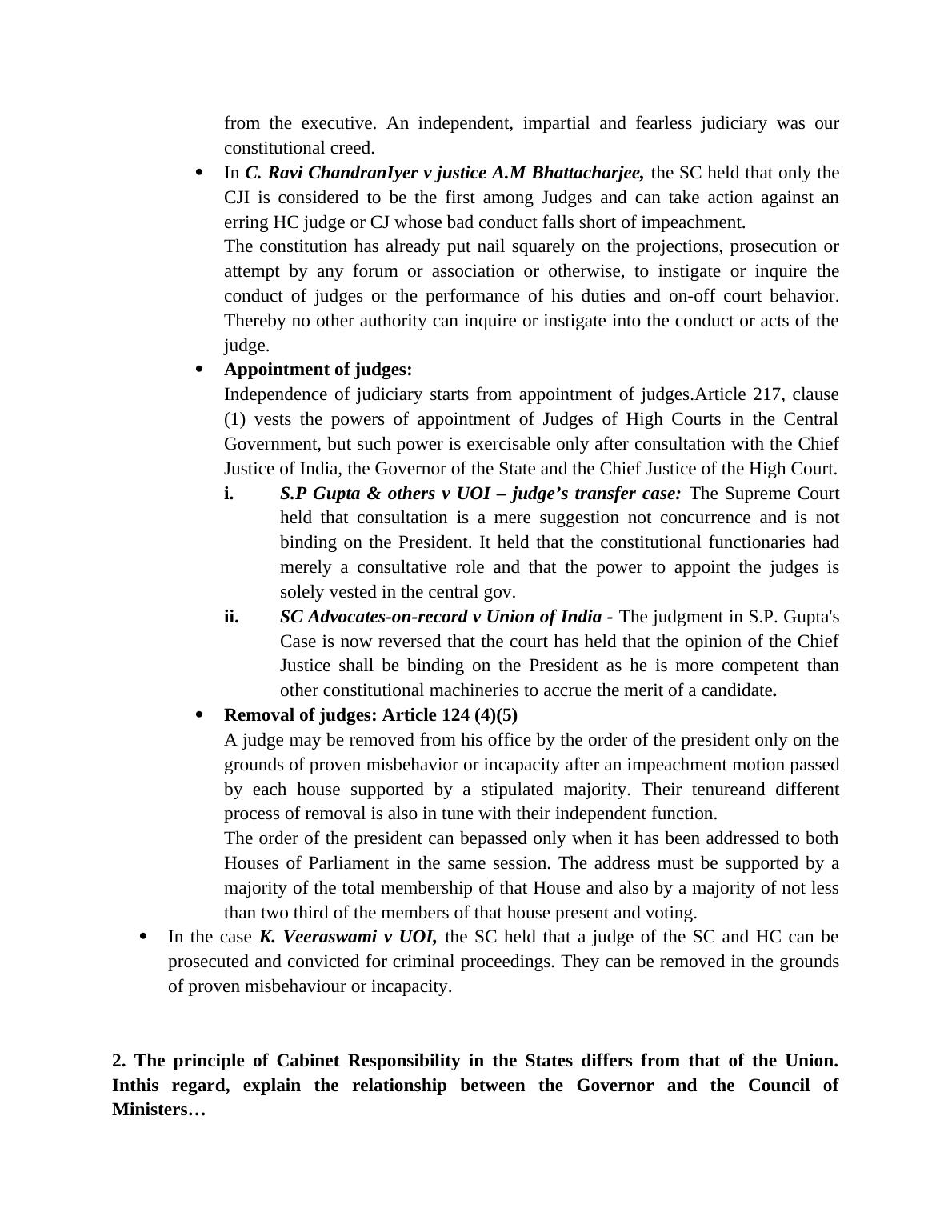
2. The principle of Cabinet Responsibility in the States differs from that of the Union.
Inthis regard, explain the relationship between the Governor and the Council of
Ministers...
Is it similar to that between the President and Council of Ministers? Discuss with thehelp of
decided case laws.
1. Yes the relation between the council of ministers and the governor is the same as the
relation between the COM and the president. But the only diff is the governor has the
authority to exercise some functions at his discretion but the president does not have the
right to do so.
2. Art 163 states that there shall be council of ministers with the CM to advice the governor
in exercise of his functions.
3. Art 163(2) the governor need not seek advice where he can exercise his discretion.
4. Usually he only acts only as a constitutional head but in times of crisis the governor can
effectively utilize the provision that the constitution has granted him that is to act upon
his discretion.
5. Cases where the governor can exercise in his discretion:
1. Appointment of CM- under Art 164 the CM is appointed by the governor. In the case
M KARUNANIDHI V UNION OF INDIA the question was raised as to if the CM or
a Minister is a public servant under section 21of IPC and also that this section
mentions the word in pay of the government. The court held that part 1 of the section
signifies only the relation between master and the servant and would not be applied
here. But according to part two states that the relation is of the master and the servant
or even a public servant so CM or any minister for that matter is a public servant. He
can be prosecuted and no prior sanction of the governor is needed.
2. Dismissal of ministry- According to Article 164 the ministers will hold office at the
pleasure of the governor. But he also cannot at the same time dismiss the minister at
his own will. Confidence of the majority is needed for dismissal. Under article 164
(2) the council of ministers is responsible to the leg assembly. As long as the ministry
enjoys confidence it cannot be dismissed by the governor. He may refuse to take the
advice of the ministry that has lost the majority. In the case MAHABIR PRASAD V
PROFULLA CHANDRA it was held that the right to withdraw the pleasure during
which the ministers hold office is absolute and unrestricted and cannot be questioned.
3. Dissolution of leg assembly- under Article 174 the governor summons and dissolves
the leg assembly. Normally it does not get dissolved till the tenure of 5 years but will
get if the ministry has lost majority. He may dissolve the house according to the
advice of the defeated CM or may not dissolve and find a new person to form an
alternate state ministry.
4. Advising the president- as per article 356 the governor has to report to the president
that there is such a situation arisen and the government of the state cannot be carried
out in the manner given in the constitution.He may advise the President to take
appropriate action to restore constitutional machinery.
Inthis regard, explain the relationship between the Governor and the Council of
Ministers...
Is it similar to that between the President and Council of Ministers? Discuss with thehelp of
decided case laws.
1. Yes the relation between the council of ministers and the governor is the same as the
relation between the COM and the president. But the only diff is the governor has the
authority to exercise some functions at his discretion but the president does not have the
right to do so.
2. Art 163 states that there shall be council of ministers with the CM to advice the governor
in exercise of his functions.
3. Art 163(2) the governor need not seek advice where he can exercise his discretion.
4. Usually he only acts only as a constitutional head but in times of crisis the governor can
effectively utilize the provision that the constitution has granted him that is to act upon
his discretion.
5. Cases where the governor can exercise in his discretion:
1. Appointment of CM- under Art 164 the CM is appointed by the governor. In the case
M KARUNANIDHI V UNION OF INDIA the question was raised as to if the CM or
a Minister is a public servant under section 21of IPC and also that this section
mentions the word in pay of the government. The court held that part 1 of the section
signifies only the relation between master and the servant and would not be applied
here. But according to part two states that the relation is of the master and the servant
or even a public servant so CM or any minister for that matter is a public servant. He
can be prosecuted and no prior sanction of the governor is needed.
2. Dismissal of ministry- According to Article 164 the ministers will hold office at the
pleasure of the governor. But he also cannot at the same time dismiss the minister at
his own will. Confidence of the majority is needed for dismissal. Under article 164
(2) the council of ministers is responsible to the leg assembly. As long as the ministry
enjoys confidence it cannot be dismissed by the governor. He may refuse to take the
advice of the ministry that has lost the majority. In the case MAHABIR PRASAD V
PROFULLA CHANDRA it was held that the right to withdraw the pleasure during
which the ministers hold office is absolute and unrestricted and cannot be questioned.
3. Dissolution of leg assembly- under Article 174 the governor summons and dissolves
the leg assembly. Normally it does not get dissolved till the tenure of 5 years but will
get if the ministry has lost majority. He may dissolve the house according to the
advice of the defeated CM or may not dissolve and find a new person to form an
alternate state ministry.
4. Advising the president- as per article 356 the governor has to report to the president
that there is such a situation arisen and the government of the state cannot be carried
out in the manner given in the constitution.He may advise the President to take
appropriate action to restore constitutional machinery.
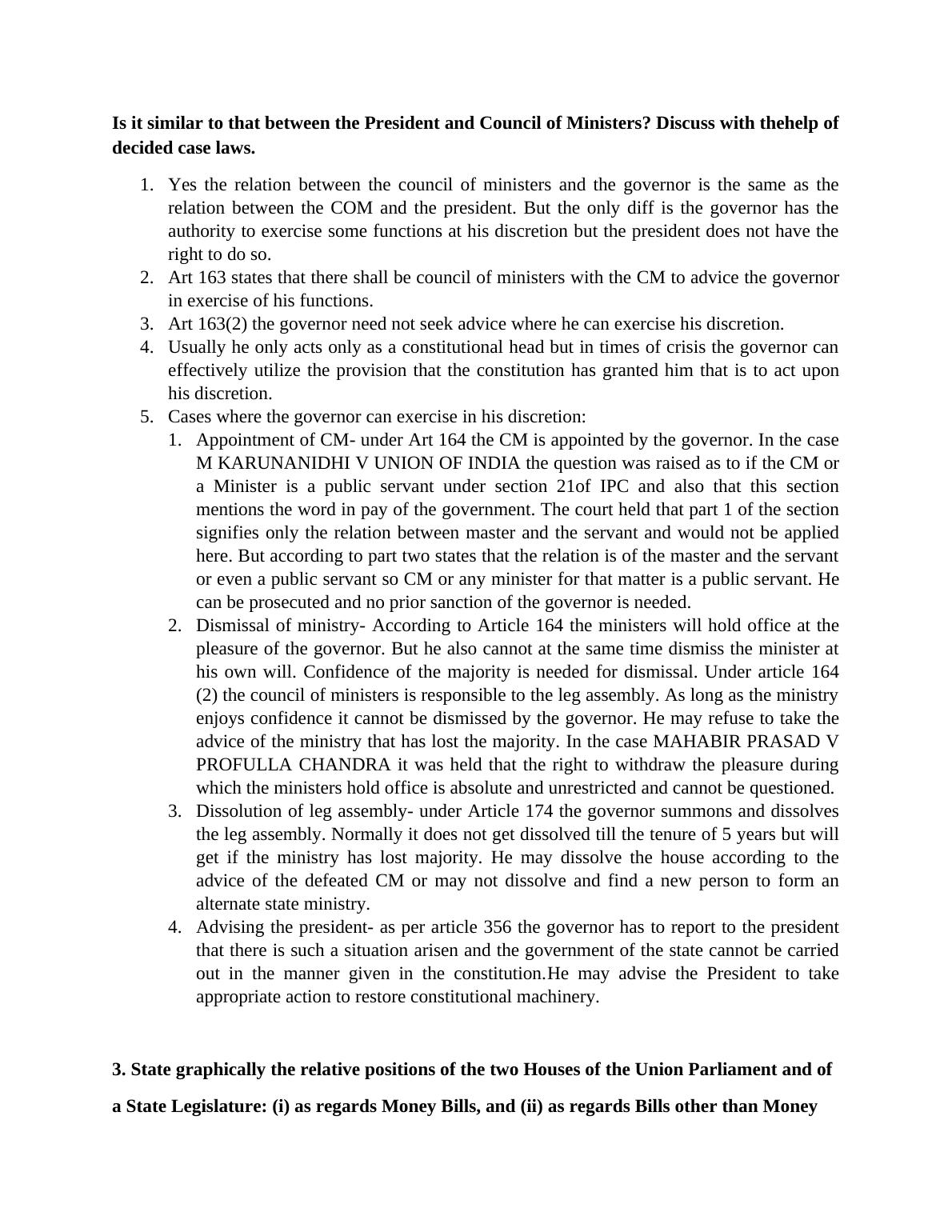
3. State graphically the relative positions of the two Houses of the Union Parliament and of
a State Legislature: (i) as regards Money Bills, and (ii) as regards Bills other than Money
Bills.
The parliament in matters regarding money bills:
1. According to Article 110(1) a money bill is a bill that contains the abolition, remission,
and alteration of the taxes, regulating the borrowing of money, deals with the
consolidated fund or the payment and withdrawal from such funds.
2. According to Article 110(3) the speaker of the loksabha decides if the bill is a money bill
or not.
3. According to Article 110(4) the speaker shall endorse a certificate that the bill is a money
bill when it’s being sent to the president for his assent.
4. The money bill can be introduced only in the loksabha and cannot be introduced in the
Rajya Sabha under Article 109(1).
5. The money bill can be introduced only with the recommendation of the president.
6. But his recommendation is not needed when there is any amendment or abolition of the
tax. As per Art 117 (1) proviso.
7. Once the money bill has been passed in the loksabha it will be sent to the Rajyasabha for
recommendations but it has to be returned within 14 days from the bill date.
8. The loksabha may either take or reject the recommendations.
9. If the loksabha accepts the recommendations then the money bill would deemed to be
passed by both the houses. But if the money bill sent to the rajyasabha and has not been
returned within 14 days then it would deemed to be passed by the loksabha at the
expiration period of 14 days.
10. The president may give his assent or refuse to give his assent to the money bill.
Regarding other than money bills:
1. An ordinary bill which is neither a money bill nor a financial bill can be introduced in
either house of the parliament.
2. The bill must be passed by both the houses of the parliament in order to get the assent of
the president.
3. The bill becomes a law only when it ahs got the assent of the president.
4. Usually the bill undergoes 3 readings before it becomes a law, the first reading is when
the bill is introduced in the house. The second reading is when the bill is discussed clause
by clause and this is when the amendments can be made. The third and the final reading
is where the bill is discussed in a general and brief way and then finally passed.
5. The bill is passed to the other house where the same procedure is repeated and if there is
any disagreement then the bill cant be passed.
6. This will create a deadlock and to resolve this, the constitution provides for a joint sitting
of the two houses.
a State Legislature: (i) as regards Money Bills, and (ii) as regards Bills other than Money
Bills.
The parliament in matters regarding money bills:
1. According to Article 110(1) a money bill is a bill that contains the abolition, remission,
and alteration of the taxes, regulating the borrowing of money, deals with the
consolidated fund or the payment and withdrawal from such funds.
2. According to Article 110(3) the speaker of the loksabha decides if the bill is a money bill
or not.
3. According to Article 110(4) the speaker shall endorse a certificate that the bill is a money
bill when it’s being sent to the president for his assent.
4. The money bill can be introduced only in the loksabha and cannot be introduced in the
Rajya Sabha under Article 109(1).
5. The money bill can be introduced only with the recommendation of the president.
6. But his recommendation is not needed when there is any amendment or abolition of the
tax. As per Art 117 (1) proviso.
7. Once the money bill has been passed in the loksabha it will be sent to the Rajyasabha for
recommendations but it has to be returned within 14 days from the bill date.
8. The loksabha may either take or reject the recommendations.
9. If the loksabha accepts the recommendations then the money bill would deemed to be
passed by both the houses. But if the money bill sent to the rajyasabha and has not been
returned within 14 days then it would deemed to be passed by the loksabha at the
expiration period of 14 days.
10. The president may give his assent or refuse to give his assent to the money bill.
Regarding other than money bills:
1. An ordinary bill which is neither a money bill nor a financial bill can be introduced in
either house of the parliament.
2. The bill must be passed by both the houses of the parliament in order to get the assent of
the president.
3. The bill becomes a law only when it ahs got the assent of the president.
4. Usually the bill undergoes 3 readings before it becomes a law, the first reading is when
the bill is introduced in the house. The second reading is when the bill is discussed clause
by clause and this is when the amendments can be made. The third and the final reading
is where the bill is discussed in a general and brief way and then finally passed.
5. The bill is passed to the other house where the same procedure is repeated and if there is
any disagreement then the bill cant be passed.
6. This will create a deadlock and to resolve this, the constitution provides for a joint sitting
of the two houses.
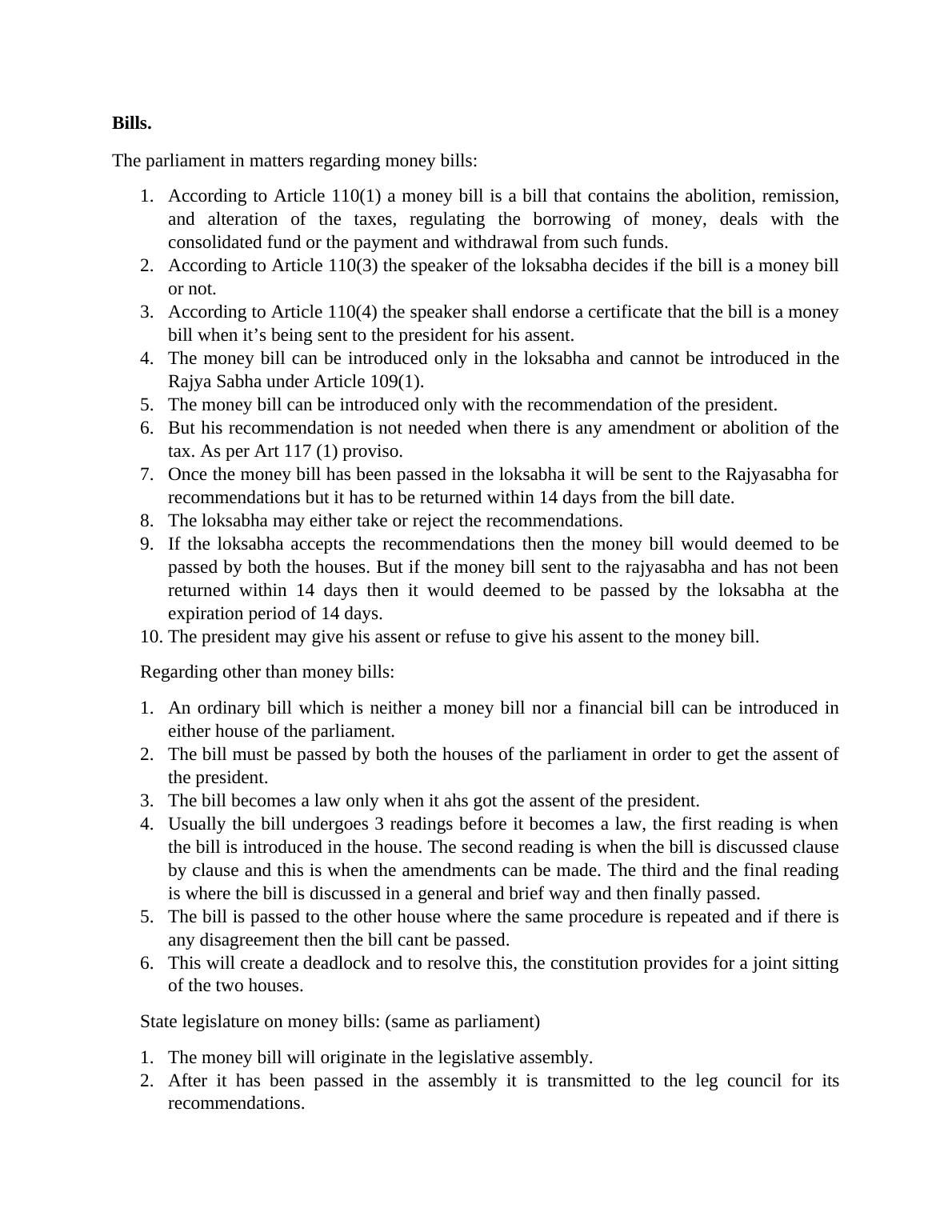
State legislature on money bills: (same as parliament)
1. The money bill will originate in the legislative assembly.
2. After it has been passed in the assembly it is transmitted to the leg council for its
recommendations.
3. The council should return within 14 days.
On bills other than money bills: it is the same as parliament but here there is no joint sitting
of the houses in case of deadlock. The decision of the leg assembly prevails (lower house).
Pg 624 1st para.
4. State the special responsibilities assigned to the Governor under the
amendedConstitution.
The Governor can go for his own decision though the Council of Ministers provides him with
advice. These are discretionary powers given to the Governor that are not very explicitly
mentioned.
Article 371 – Maharashtra and Gujarat, 7th Amendment
Governors of the states of Maharashtra and Gujarat are given special responsibilities to set up development
boards in regions such as Vidarbha, Marathwada, Kutchh etc.
Aticle371A – Nagaland, 1962
Article 371A of the Constitution mainly states that no act of Parliament would apply to the state of
Nagaland in matter relating to religious or social practices of Nagas, Naga customary law and
procedure, administration of civil or criminal justice involving decisions according to Naga customary law
and ownership and transfer of land and its resources. The Legislative Assembly of Nagaland must
pass a resolution for an act to be applicable to the state.
The governor is given special responsibilities with respect to law and order in the state as well.
Article 371B – Assam
According to the special provision under Article 371B, the president may provide for the Constitution and
functions of a committee of Legislative Assembly of the state consisting of members elected from the
tribal areas of Assam.
Article 371C – Manipur,1971
1. The money bill will originate in the legislative assembly.
2. After it has been passed in the assembly it is transmitted to the leg council for its
recommendations.
3. The council should return within 14 days.
On bills other than money bills: it is the same as parliament but here there is no joint sitting
of the houses in case of deadlock. The decision of the leg assembly prevails (lower house).
Pg 624 1st para.
4. State the special responsibilities assigned to the Governor under the
amendedConstitution.
The Governor can go for his own decision though the Council of Ministers provides him with
advice. These are discretionary powers given to the Governor that are not very explicitly
mentioned.
Article 371 – Maharashtra and Gujarat, 7th Amendment
Governors of the states of Maharashtra and Gujarat are given special responsibilities to set up development
boards in regions such as Vidarbha, Marathwada, Kutchh etc.
Aticle371A – Nagaland, 1962
Article 371A of the Constitution mainly states that no act of Parliament would apply to the state of
Nagaland in matter relating to religious or social practices of Nagas, Naga customary law and
procedure, administration of civil or criminal justice involving decisions according to Naga customary law
and ownership and transfer of land and its resources. The Legislative Assembly of Nagaland must
pass a resolution for an act to be applicable to the state.
The governor is given special responsibilities with respect to law and order in the state as well.
Article 371B – Assam
According to the special provision under Article 371B, the president may provide for the Constitution and
functions of a committee of Legislative Assembly of the state consisting of members elected from the
tribal areas of Assam.
Article 371C – Manipur,1971
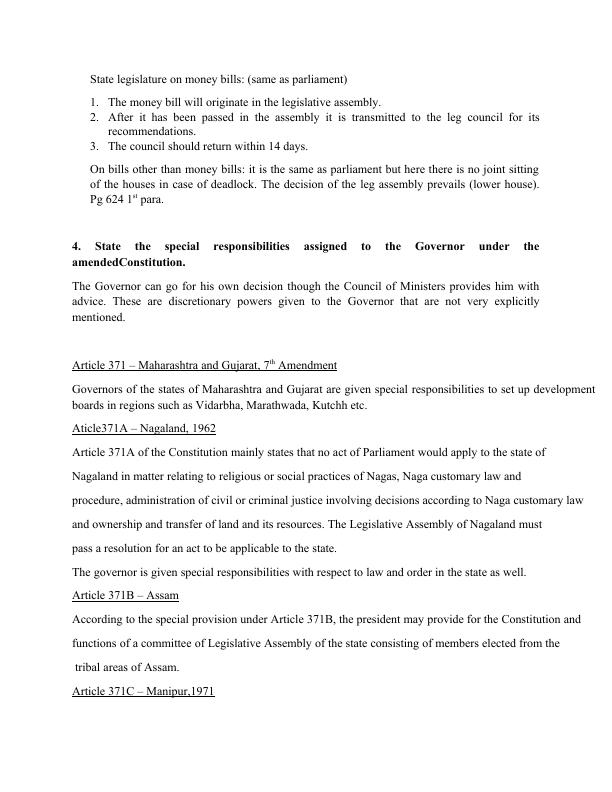
The special provision under Article 371C in the case of Manipur is similar to 371B for Assam. Here, too,
the president may provide for the Constitution and functions of a committee of Legislative Assembly
of the state, but consisting of members elected from the hill areas of Manipur.The governor must submit an
annual report to the president regarding the administration of hill areas as well.
Article 371D & E – Andhra Pradesh
Article 371D, which was added to the Constitution in 1974, provides equitable opportunities and
facilities for the people of the state and safeguards their rights in matters of employment and
education. The state government may organize civil posts or direct recruitment to posts in local
cadre as required.
Article 371E states that the Parliament may by law provide for the establishment of a University
in Andhra Pradesh.
Article 371F – Sikkim, 36th Amendment 1975
Article 371F was incorporated into the Constitution in 1975. It states that the Legislative
Assembly shall consist of not less than 30 members. In order to protect the rights and interests of
the different sections of the population in the state of Sikkim, seats in the assembly are provided
to people of these different sections.
Article 371G – Mizoram
The Legislative Assembly of the state of Mizoram must consist of not less than 40 members. In
addition, following the same provisions as Nagaland, an act of Parliament would not apply to
Mizoram in matters relating to religious or social practices of Mizo, Mizo customary law and
procedure, administration of civil or criminal justice involving decisions according to Mizo
customary law, ownership and transfer of land and its resources.
Article 371H – Arunachal Pradesh
The Legislative Assembly of the state of AP must consist of not less than 30 members. The
governor will have special responsibility with respect to law and order in the state.
Article 371I – Goa
The Legislative Assembly of the state of Goa must consist of not less than 30 members.
Article 371J, Karnataka, 98th Amendment
the president may provide for the Constitution and functions of a committee of Legislative Assembly
of the state, but consisting of members elected from the hill areas of Manipur.The governor must submit an
annual report to the president regarding the administration of hill areas as well.
Article 371D & E – Andhra Pradesh
Article 371D, which was added to the Constitution in 1974, provides equitable opportunities and
facilities for the people of the state and safeguards their rights in matters of employment and
education. The state government may organize civil posts or direct recruitment to posts in local
cadre as required.
Article 371E states that the Parliament may by law provide for the establishment of a University
in Andhra Pradesh.
Article 371F – Sikkim, 36th Amendment 1975
Article 371F was incorporated into the Constitution in 1975. It states that the Legislative
Assembly shall consist of not less than 30 members. In order to protect the rights and interests of
the different sections of the population in the state of Sikkim, seats in the assembly are provided
to people of these different sections.
Article 371G – Mizoram
The Legislative Assembly of the state of Mizoram must consist of not less than 40 members. In
addition, following the same provisions as Nagaland, an act of Parliament would not apply to
Mizoram in matters relating to religious or social practices of Mizo, Mizo customary law and
procedure, administration of civil or criminal justice involving decisions according to Mizo
customary law, ownership and transfer of land and its resources.
Article 371H – Arunachal Pradesh
The Legislative Assembly of the state of AP must consist of not less than 30 members. The
governor will have special responsibility with respect to law and order in the state.
Article 371I – Goa
The Legislative Assembly of the state of Goa must consist of not less than 30 members.
Article 371J, Karnataka, 98th Amendment
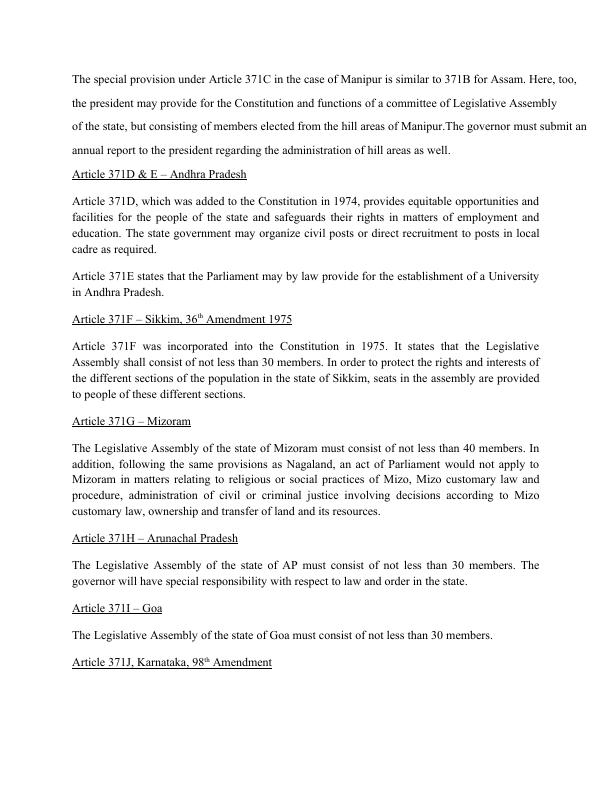
Article 371J grants special status to six backward districts of Hyderabad-Karnataka region. The special
provision requires that a separate development board be established for these regions (similar to
Maharashtra and Gujarat) and also ensures local reservation in education and government jobs.
5. Discuss with the help of appropriate case laws the constitutional provisions relating to
thetransfer of judge from one High Court to another High Court.
Position prior to 99th amendment of the constitution:
Article 217:
Every judge of the HC will be appointed by the President.
After consulting the CJI and the Governor of the respective states the CJ of that particular
HC will be appointed.
In case of appointment of a Judge other than the CJ, then the CJ of that particular court
will be consulted by the President.
Article 222(1):
This states that after consultation from the CJI, the President can transfer a Judge from one HC to
another.
This can be better understood with the help of the following case laws:
I. UOI Vs. Shankalchand:
Justice Shankalchand was transferred from Gujarat HC to AP HC. It was challenged that
the transfer was done without the consent of the Judge, against public interest and
without consultation from the CJI. The SC by a majority of 3:2, held that a Judge can be
transferred without his consent as per Art.222(1). If consent has to be asked and the
Judge withholds it, the whole power contained in Art.222 will be rendered ineffective.
However, this clause casts an absolute obligation on the President to consult the CJI
before transferring a Judge from one HC to another. That is a condition precedent to an
actual transfer of the Judge. If the facts necessary to arrive at a proper conclusion is not
provided by the President, then the CJI is obliged to ask for the necessary details to come
to a solid decision as the duty is imposed on him too. Thus, Art.222(1) means full and
effective, not formal and unproductive.
II. S.P.Gupta Vs. UOI:
Under the Art.217, the President is obliged to get consultation from three functionaries,
the CJI, the CJ of the HC and the Governor of the State. In this case, the President took
the consultation of the CJ of the HC to disapprove the extension of a Justice at HC due to
a complaint against him. However, the CJI recommended the extension valid as there was
provision requires that a separate development board be established for these regions (similar to
Maharashtra and Gujarat) and also ensures local reservation in education and government jobs.
5. Discuss with the help of appropriate case laws the constitutional provisions relating to
thetransfer of judge from one High Court to another High Court.
Position prior to 99th amendment of the constitution:
Article 217:
Every judge of the HC will be appointed by the President.
After consulting the CJI and the Governor of the respective states the CJ of that particular
HC will be appointed.
In case of appointment of a Judge other than the CJ, then the CJ of that particular court
will be consulted by the President.
Article 222(1):
This states that after consultation from the CJI, the President can transfer a Judge from one HC to
another.
This can be better understood with the help of the following case laws:
I. UOI Vs. Shankalchand:
Justice Shankalchand was transferred from Gujarat HC to AP HC. It was challenged that
the transfer was done without the consent of the Judge, against public interest and
without consultation from the CJI. The SC by a majority of 3:2, held that a Judge can be
transferred without his consent as per Art.222(1). If consent has to be asked and the
Judge withholds it, the whole power contained in Art.222 will be rendered ineffective.
However, this clause casts an absolute obligation on the President to consult the CJI
before transferring a Judge from one HC to another. That is a condition precedent to an
actual transfer of the Judge. If the facts necessary to arrive at a proper conclusion is not
provided by the President, then the CJI is obliged to ask for the necessary details to come
to a solid decision as the duty is imposed on him too. Thus, Art.222(1) means full and
effective, not formal and unproductive.
II. S.P.Gupta Vs. UOI:
Under the Art.217, the President is obliged to get consultation from three functionaries,
the CJI, the CJ of the HC and the Governor of the State. In this case, the President took
the consultation of the CJ of the HC to disapprove the extension of a Justice at HC due to
a complaint against him. However, the CJI recommended the extension valid as there was
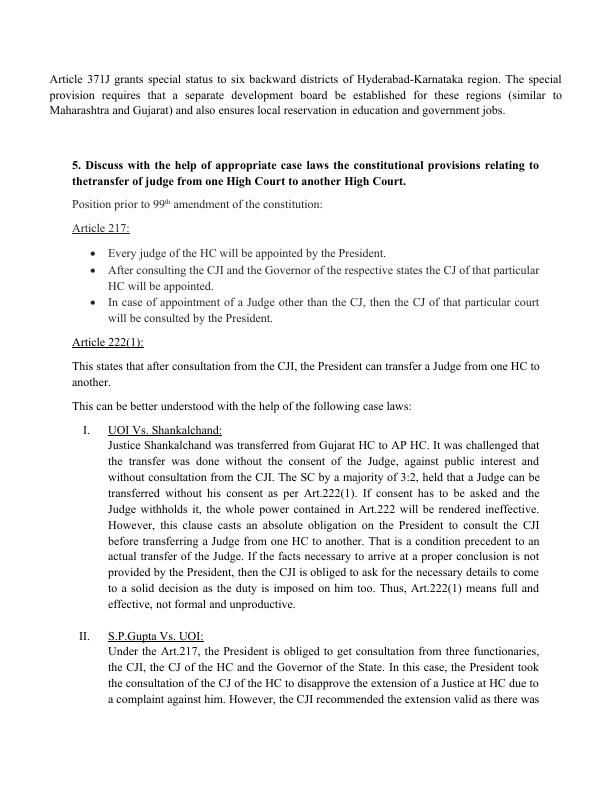
End of preview
Want to access all the pages? Upload your documents or become a member.
Related Documents
Essay on the Monetary Board of the Central Banklg...
|4
|1683
|50
Nature of English Legal Systemlg...
|14
|1155
|21